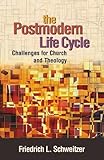The postmodern life cycle : challenges for church and theology / Friedrich L. Schweitzer.
Material type: TextPublication details: St. Louis, Mo. : Chalice Press, ©2004.Description: 1 online resource (152 pages)Content type:
TextPublication details: St. Louis, Mo. : Chalice Press, ©2004.Description: 1 online resource (152 pages)Content type: - 9780827230644
- 0827230648
- 9780827232846
- 0827232845
- Life cycle, Human -- Religious aspects -- Christianity
- Postmodernism -- Religious aspects -- Christianity
- RELIGION -- Christian Life -- Social Issues
- RELIGION -- Christianity -- General
- PSYCHOLOGY -- Developmental -- Lifespan Development
- Life cycle, Human -- Religious aspects -- Christianity
- Postmodernism -- Religious aspects -- Christianity
- Levenscyclus (sociale wetenschappen, biologie)
- Postmodernisme
- Religieuze aspecten
- 261.8 22
- BV4597.555 .S39 2004eb
- online - EBSCO
- 11.70
| Item type | Current library | Call number | URL | Status | Notes | Barcode | |
|---|---|---|---|---|---|---|---|
 eBook
eBook
|
Biblioteca "Angelicum" Pont. Univ. S.Tommaso d'Aquino Nuvola online | online - EBSCO (Browse shelf(Opens below)) | Online access | Not for loan (Accesso limitato) | Accesso per gli utenti autorizzati / Access for authorized users | (ebsco)509190 |
Includes bibliographical references (pages 140-152).
The religious demands of postmodern life : challenges for practical theology -- Born into a plural world : growing up between multicultural richness and religious homelessness -- In search of a faith of one's own : the identity of plural selves in adolescence -- Religious affiliation and distancing in postadolescence : the impact of a neglected period of life -- Church, individual religion, public responsibility : images of faith between modern and postmodern adulthood -- Between adulthood and old age : the question of a "third age" -- Theological demands on postmodern life : towards a theology of the life cycle -- Epiloque : still a life cycle?
Print version record.
Schweitzer?s goal in this book is to explore what postmodernity actually means for theology and how theology and the church may respond to its challenges. He focuses on the life cycle as it is changing with the advent of postmodernity, looking sequentially at segments of the life cycle using different lenses: modernity, postmodernity, and responses from church and theology. Schweitzer concludes with a theology of the life cycle.


